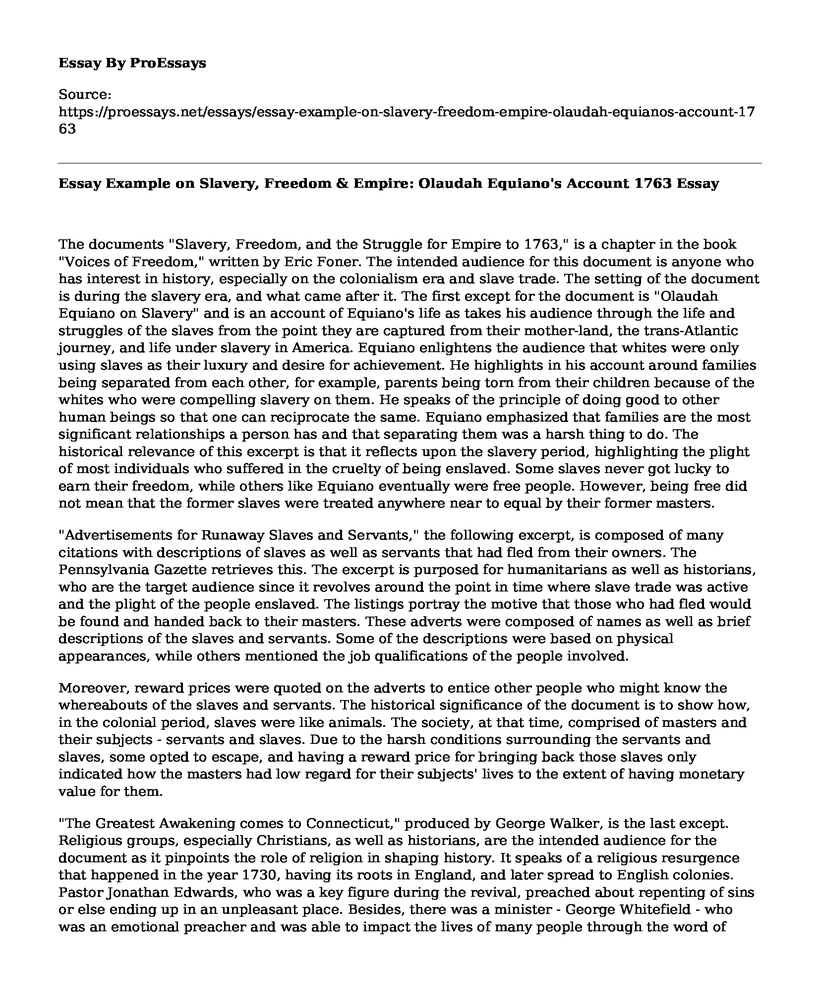The documents "Slavery, Freedom, and the Struggle for Empire to 1763," is a chapter in the book "Voices of Freedom," written by Eric Foner. The intended audience for this document is anyone who has interest in history, especially on the colonialism era and slave trade. The setting of the document is during the slavery era, and what came after it. The first except for the document is "Olaudah Equiano on Slavery" and is an account of Equiano's life as takes his audience through the life and struggles of the slaves from the point they are captured from their mother-land, the trans-Atlantic journey, and life under slavery in America. Equiano enlightens the audience that whites were only using slaves as their luxury and desire for achievement. He highlights in his account around families being separated from each other, for example, parents being torn from their children because of the whites who were compelling slavery on them. He speaks of the principle of doing good to other human beings so that one can reciprocate the same. Equiano emphasized that families are the most significant relationships a person has and that separating them was a harsh thing to do. The historical relevance of this excerpt is that it reflects upon the slavery period, highlighting the plight of most individuals who suffered in the cruelty of being enslaved. Some slaves never got lucky to earn their freedom, while others like Equiano eventually were free people. However, being free did not mean that the former slaves were treated anywhere near to equal by their former masters.
"Advertisements for Runaway Slaves and Servants," the following excerpt, is composed of many citations with descriptions of slaves as well as servants that had fled from their owners. The Pennsylvania Gazette retrieves this. The excerpt is purposed for humanitarians as well as historians, who are the target audience since it revolves around the point in time where slave trade was active and the plight of the people enslaved. The listings portray the motive that those who had fled would be found and handed back to their masters. These adverts were composed of names as well as brief descriptions of the slaves and servants. Some of the descriptions were based on physical appearances, while others mentioned the job qualifications of the people involved.
Moreover, reward prices were quoted on the adverts to entice other people who might know the whereabouts of the slaves and servants. The historical significance of the document is to show how, in the colonial period, slaves were like animals. The society, at that time, comprised of masters and their subjects - servants and slaves. Due to the harsh conditions surrounding the servants and slaves, some opted to escape, and having a reward price for bringing back those slaves only indicated how the masters had low regard for their subjects' lives to the extent of having monetary value for them.
"The Greatest Awakening comes to Connecticut," produced by George Walker, is the last except. Religious groups, especially Christians, as well as historians, are the intended audience for the document as it pinpoints the role of religion in shaping history. It speaks of a religious resurgence that happened in the year 1730, having its roots in England, and later spread to English colonies. Pastor Jonathan Edwards, who was a key figure during the revival, preached about repenting of sins or else ending up in an unpleasant place. Besides, there was a minister - George Whitefield - who was an emotional preacher and was able to impact the lives of many people through the word of God. After that, many other religious ministers moved into America and termed the period as a reborn of a robust faith. With the awakening came political as well as religious independence, and the colonists began to defy the authority through speaking their minds. The historical importance of this document is to outlay how crucial the idea of religion was to the union and later independence of the colonists. It shows us, readers, that society, at that particular time, was divided in many aspects, and everyone was individualistic in their quest.
Reference
Foner, E., (2016). Voices of Freedom: A Documentary History (5th ed.). New York: W.W. Norton & Company. https://www.amazon.com/Voices-Freedom-Documentary-History-Fifth/dp/0393614506
Cite this page
Essay Example on Slavery, Freedom & Empire: Olaudah Equiano's Account 1763. (2023, Feb 27). Retrieved from https://proessays.net/essays/essay-example-on-slavery-freedom-empire-olaudah-equianos-account-1763
If you are the original author of this essay and no longer wish to have it published on the ProEssays website, please click below to request its removal:
- Essay Sample on Pre-Colonization History of the Native Americans in Texas
- Essay Sample on Renaissance in Europe
- Factors That Shaped the European Attitudes Towards the Locals Essay
- Essay Example on Maus: A Breakthrough in Holocaust Literature Analysis
- The Black Panther Party: A Closer Look at the Controversial US Movement - Research Paper
- Essay Example on Ancient Civilizations: Comparing Customs and Social Behaviors
- Paper Sample on Iraq War Syndrome: A Scientific Review of Post-War Effects







